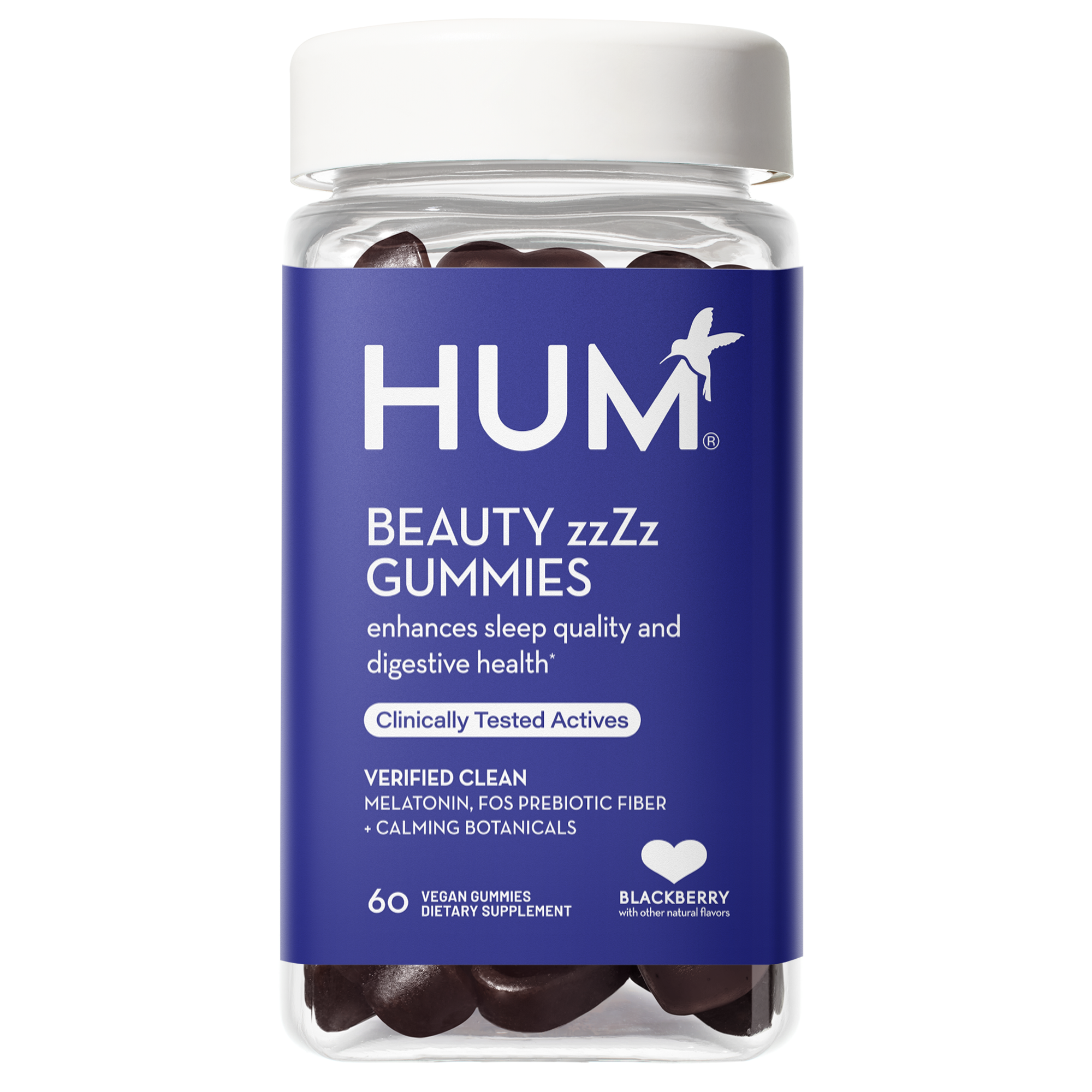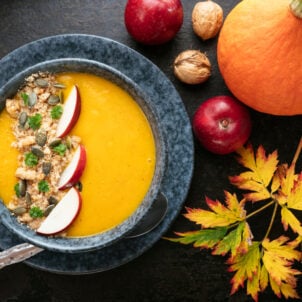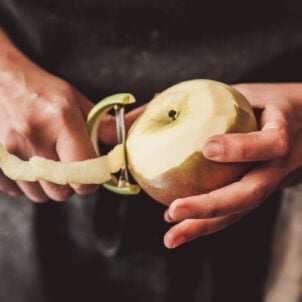Are you among the one third of adults in the US who don’t log enough hours of sleep each night? If so, you know all too well how much the lack of shut-eye can hinder your wellness goals. You’re probably not only groggy and foggy the next day, but also perhaps relying too heavily on caffeine and getting intense cravings—all the while heightening your chances for more serious health issues down the line. But it’s not all doom and gloom. It’s well within your power to make a few simple dietary modifications to say goodbye to sleepless nights and hello to the high-quality ZZZ’s that dreams are made of.
Ahead, dietitians share actionable tips and insights—including what and when to eat (and not eat) for a good snooze—that you definitely don’t want to sleep on.
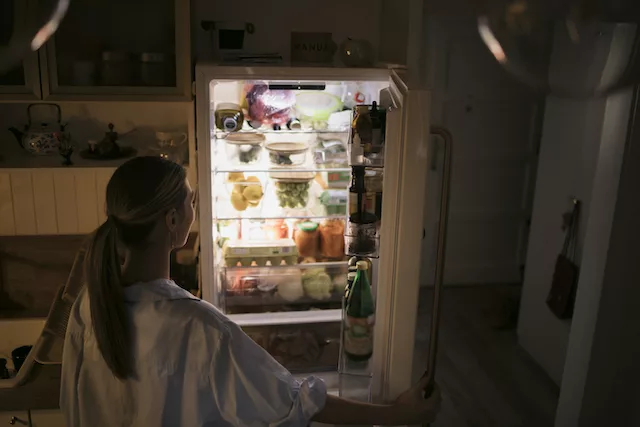
5 Dietary Hacks for Better Sleep
What you eat and how you eat, both throughout the day and closer to bed, can both help and hinder sleep. For starters, “Caffeine, alcohol, sugar, and simple carbohydrates can all be disruptive to sleep patterns due to their ability to increase energy and disrupt blood sugar levels,” explains Amy Shapiro, MS, RD, of Real Nutrition NYC. Eating too much at night, she adds, can also wreak havoc on your sleep since your body will be busy digesting rather than focusing on repair.
Heed these cautions and see how else nutrition and sleep are linked—for better or for worse—with the following hacks and must-know intel.
1. Eat Balanced a Dinner
According to Brooklyn-based dietitian Maddie Pasquariello, MS, RD, this tip is crucial for several reasons. “A nutrient-dense dinner that contains a balance of macronutrients—protein, carbohydrates, and fat—may help stabilize blood sugar by regulating the secretion of ghrelin, GLP-1, and other hormones, which in turn can prevent nighttime hunger and waking,” she explains.
Moreover, it pays to be mindful of your macros since enzymes involved in macronutrient metabolism are linked to your biological clock. “Specifically, larger quantities of carbohydrates and fat at dinner time can increase the amount of REM sleep we receive,” Pasquariello continues. This might sound innocuous, but more REM sleep (which is famously linked to dreaming) could potentially cost you more deep sleep. The RD also mentions that greater quantities of protein—namely the amino acid tryptophan, which we’ll soon discuss—can boost serotonin levels and thus support better sleep at large. “The caveat is that evidence here is extremely mixed and studies in humans are still [limited],” she says. “These findings certainly don’t mean you should overload your dinner with protein at the expense of fruit, veggies, and complex carbs.”
Shapiro recommends the following to build a plate that can help you sleep and prevent nighttime hunger (which, too, can inhibit your ability to successfully hit the hay):
- Lean protein
- Non-starchy vegetables
- Up to a tablespoon of healthy fat
- A fist-size of complex carbs (e.g., sweet potato, potato, whole wheat pasta, and whole grains)
All the while, Pasquariello says it’s not worth chiding yourself for occasionally eating heavier, less healthy fare for your last meal of the day. “A single heavy dinner might cause you to feel a little stomach upset if you lie down immediately after and try to go to sleep. But for most of us, our goals are highly unlikely to be derailed from one heavy meal,” she notes. “Instead, I’d advise taking a more holistic look at your overall dietary contents.” This includes but isn’t limited to the content, nutrient diversity, and quality of your meals throughout the day—not just what’s on your plate past nightfall.
2. Prioritize Sleep-Friendly Foods
You can always prioritize specific foods that help you sleep. They’ll contain certain nutrients that can have positive (yet different) effects on your ZZZ’s, including:
- Melatonin: This hormone promotes healthy sleep-wake cycles. “We often use melatonin to restore sleep cycles in situations like aging (as we don’t produce as much melatonin as we age) and jet lag,” Shapiro explains. Foods rich in melatonin include tart cherries, walnuts, goji berries, milk, pistachios, almonds, salmon, and sardines. “Enjoying these foods 30 minutes to one hour prior to sleep can help promote sleep,” she notes.
- Tryptophan: This amino acid is a precursor to serotonin and melatonin, meaning it supports the regulation of mood and sleep alike. “Whole milk, tuna, turkey, oats, chicken, and cheese all contain tryptophan—with milk having the largest amount,” says Shapiro.
- Magnesium: Magnesium is crucial for the majority of the body’s functions—including those that can contribute to your quest to rest well. While it’s not as fast-acting as the sleep-friendly nutrients noted above, Shapiro says it’s still important to maintain your magnesium levels from one day to the next. Among other things, she warns that deficiencies can lead to disrupted sleep. “Having a consistent intake of foods rich in magnesium—including spinach, eggs, almonds, yogurt, milk, and banana—is helpful overall, but also a snack before bed can help. For instance, having a small serving of yogurt and almonds can help you to sleep because of the nutrients that prevent hunger but also the magnesium.” Think of these items as super snacks that can improve your sleep and overall well-being, one bite or sip at a time.
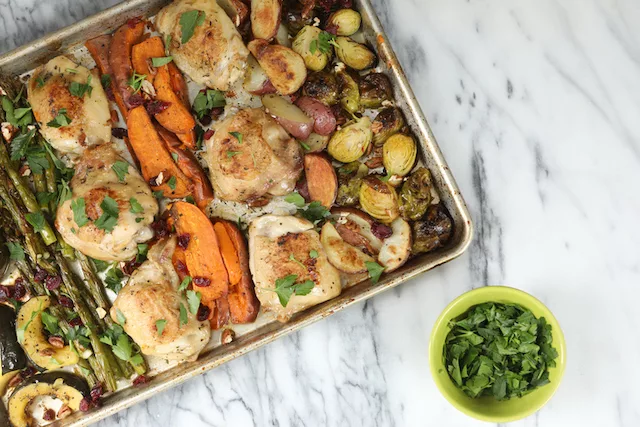
3. Be Mindful of Nighttime Noshing
Is there actually an ideal time to eat dinner to promote better sleep—and should you really stick to a hard cutoff time for meals and snacks alike? Pasquariello says that the research on these points is highly mixed and not to put *too* much faith in generalizations.
“Some researchers have suggested that eating dinner within one hour of bedtime can affect sleep latency,” aka the time it takes to fall asleep, she notes. “They suggest that the sweet spot for eating dinner is around three to four hours before you intend to go to bed. But others have suggested that there is no consequence at all to eating dinner late.” With these points in mind, Pasquariello gives the green light to eating a balanced meal or healthy snack closer to bedtime—so long as it works for you.
However, that extra buffer room between noshing and snoozing may be more ideal for some people. “For instance, if you experience reflux, it can help to avoid eating a large meal right before you go to bed,” she shares. If you’re in this camp, Shapiro adds that you’ll want to lay off high-fat and fried foods since they can exacerbate acid reflux and slow down motility, thus disrupting sleep even further.
4. Hydrate Strategically
While it’s essential to stay hydrated throughout the day, it could be worth tapering down your H2O intake in the evening for the sake of better sleep. “If you experience frequent nocturia (nighttime waking to urinate), it can help to restrict fluids before bedtime,” Pasquariello shares. An estimated one in three adults over 30 make two or more twilight trips to the bathroom, with the number climbing significantly for older adults. Since nocturia is associated with long-term sleep deprivation, it’s important to get ahead of it before it evolves into a bigger issue.
That said, aim to cease fluid intake for three hours before bedtime to help prevent nighttime waking. You can also take small sips (rather than large chugs) as needed to quench your thirst, as well as remember to relieve your bladder before hopping into bed.
5. Limit Caffeine and Alcohol
You probably already know that caffeine and alcohol intake run counter to a good night’s rest. In case it’s unclear as to why, Pasquariello summarizes that:
- Caffeine has a fairly long half-life, so it’ll stay in the body for five to 10 hours after you drink it
- Alcohol is thought to affect REM sleep as well as slow wave sleep (which can leave you feeling groggy or restless upon waking), as well as increase circulating adenosine levels (which can cause you to wake up throughout the night)
It’s easier said than done to lay off these bevs completely if they’re in your rotation. But for the sake of your shut-eye, she recommends trying to keep the last cup of caffeine to before 12 p.m. and avoiding using nightcaps as a crutch to doze off.
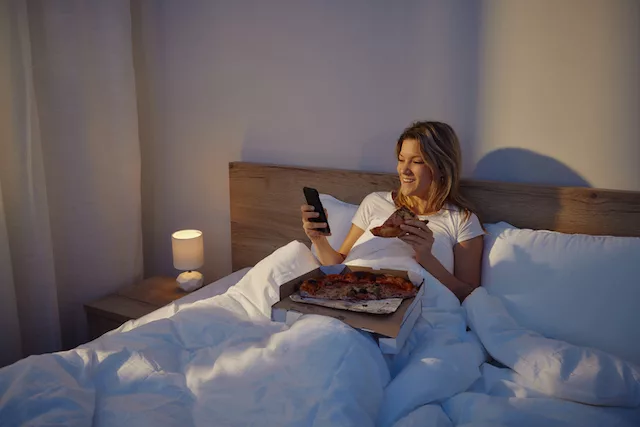
The Takeaway
Of course, there are many elements at play that impact your sleep quality—including but not limited to your stress levels, physical activity, and sleep hygiene. The road to better sleep is a science, but it’s one that you can begin to master, at least in part, by creating smarter dietary habits that are conducive to falling and staying asleep.
